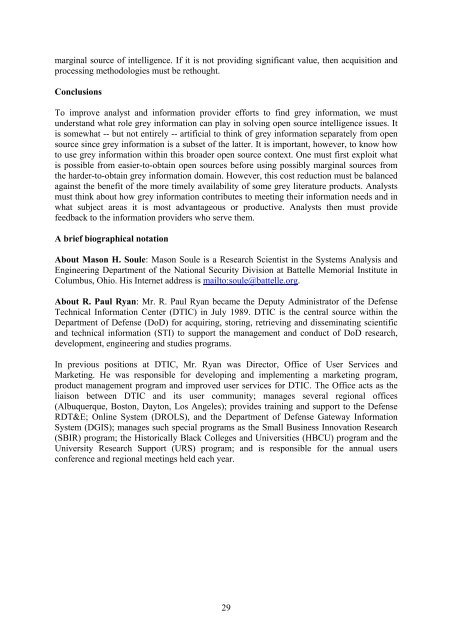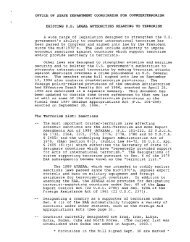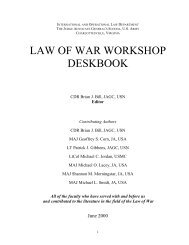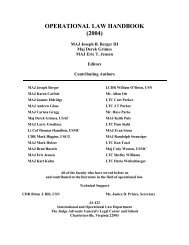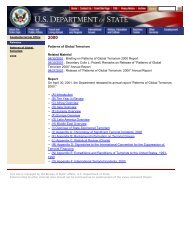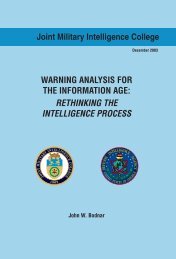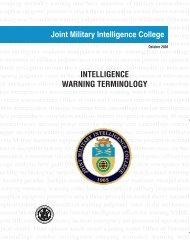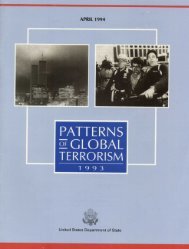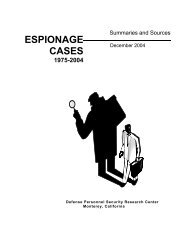OPEN SOURCE INTELLIGENCE - The Challenge for NATO - OSS.net
OPEN SOURCE INTELLIGENCE - The Challenge for NATO - OSS.net
OPEN SOURCE INTELLIGENCE - The Challenge for NATO - OSS.net
Create successful ePaper yourself
Turn your PDF publications into a flip-book with our unique Google optimized e-Paper software.
marginal source of intelligence. If it is not providing significant value, then acquisition and<br />
processing methodologies must be rethought.<br />
Conclusions<br />
To improve analyst and in<strong>for</strong>mation provider ef<strong>for</strong>ts to find grey in<strong>for</strong>mation, we must<br />
understand what role grey in<strong>for</strong>mation can play in solving open source intelligence issues. It<br />
is somewhat -- but not entirely -- artificial to think of grey in<strong>for</strong>mation separately from open<br />
source since grey in<strong>for</strong>mation is a subset of the latter. It is important, however, to know how<br />
to use grey in<strong>for</strong>mation within this broader open source context. One must first exploit what<br />
is possible from easier-to-obtain open sources be<strong>for</strong>e using possibly marginal sources from<br />
the harder-to-obtain grey in<strong>for</strong>mation domain. However, this cost reduction must be balanced<br />
against the benefit of the more timely availability of some grey literature products. Analysts<br />
must think about how grey in<strong>for</strong>mation contributes to meeting their in<strong>for</strong>mation needs and in<br />
what subject areas it is most advantageous or productive. Analysts then must provide<br />
feedback to the in<strong>for</strong>mation providers who serve them.<br />
A brief biographical notation<br />
About Mason H. Soule: Mason Soule is a Research Scientist in the Systems Analysis and<br />
Engineering Department of the National Security Division at Battelle Memorial Institute in<br />
Columbus, Ohio. His Inter<strong>net</strong> address is mailto:soule@battelle.org.<br />
About R. Paul Ryan: Mr. R. Paul Ryan became the Deputy Administrator of the Defense<br />
Technical In<strong>for</strong>mation Center (DTIC) in July 1989. DTIC is the central source within the<br />
Department of Defense (DoD) <strong>for</strong> acquiring, storing, retrieving and disseminating scientific<br />
and technical in<strong>for</strong>mation (STI) to support the management and conduct of DoD research,<br />
development, engineering and studies programs.<br />
In previous positions at DTIC, Mr. Ryan was Director, Office of User Services and<br />
Marketing. He was responsible <strong>for</strong> developing and implementing a marketing program,<br />
product management program and improved user services <strong>for</strong> DTIC. <strong>The</strong> Office acts as the<br />
liaison between DTIC and its user community; manages several regional offices<br />
(Albuquerque, Boston, Dayton, Los Angeles); provides training and support to the Defense<br />
RDT&E; Online System (DROLS), and the Department of Defense Gateway In<strong>for</strong>mation<br />
System (DGIS); manages such special programs as the Small Business Innovation Research<br />
(SBIR) program; the Historically Black Colleges and Universities (HBCU) program and the<br />
University Research Support (URS) program; and is responsible <strong>for</strong> the annual users<br />
conference and regional meetings held each year.<br />
29


